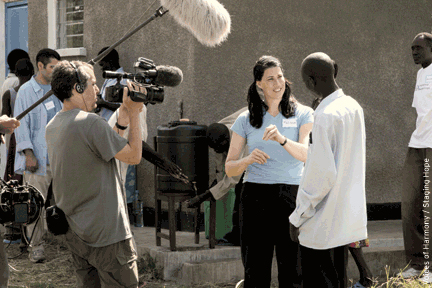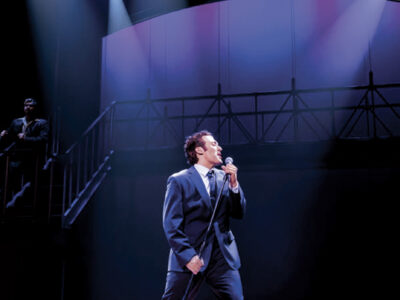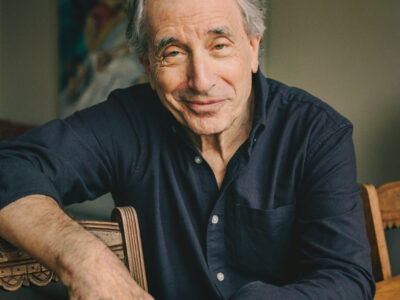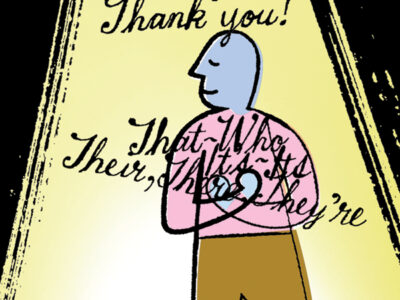
Class of ’87 | Melissa Fitzgerald C’87 arrived in Uganda at a strange time in her own life. She’d just finished a long run on The West Wing TV series, and her marriage to a fellow actor had recently ended. She didn’t know what would come next—another TV series? A movie? Live theater?—but she could worry about that later. Her newly flexible schedule offered something she’d wanted for years: more time to help others.
Given the chance to volunteer abroad, she’d chosen a trip to war-torn northern Uganda with the International Medical Corps (IMC). There, with a cheap video camera in hand, she visited cramped, unsanitary camps for refugees. Thousands were dying in the camps every month, and a surge of cholera was taking still more lives. As Fitzgerald and her group left one of the sites, shaken by everything they’d just seen, a man approached them and implored: “Please don’t let us die in this horrible place. Please tell the people in America what is happening here.”
“Since then,” Fitzgerald recently said, “that has been my mission.”
She started right away, helping IMC officials turn the amateur footage she’d shot in Uganda into a documentary called Hope Not Lost. It won a few awards, which got her thinking: “What if I actually did set out to make a movie? What if I did assemble a team of talented filmmakers? If this little home video camera I brought can make a movie with this much impact, imagine what a well-done movie could achieve.”
Two years later Fitzgerald returned to Uganda with a group of actors, playwrights, and activists to film Staging Hope: Acts of Peace in Northern Uganda (voicesofuganda.org). The documentary chronicles her group’s efforts to help 14 Ugandan teens transform their traumatic experiences into theater. In November, it screened in the Philadelphia and Denver film festivals and took home the audience-favorite award from both.
“That, to us, was the best prize we could get,” says Fitzgerald, who co-produced Staging Hope with fellow alumna Katy Fox Gr’08. “We wanted to make a film that would not only expose what’s happening in Uganda, but would also be something people would enjoy watching. What’s happening there is horrific, but the people there also have a tremendous amount of joy and love, and they were so excited about participating in our theater program.”
Through Fitgerald’s program, the Ugandan teens—among them former child soldiers and sex slaves—created two plays based on their own experiences with reconciliation, peace-building, and HIV/AIDS. In a place like Uganda, Fitzgerald adds, such works of theater are about more than entertainment.
“There’s no television there and access to education is very limited,” she says. “So the question becomes, how do you educate a community about different issues? You can’t hand out a pamphlet, because most people can’t read it. Theater is a great way to share information, and it can play an important role in peace-building and reconciliation [efforts]. These teenagers were able to tell their community what they felt was important.”
Fitzgerald had some experience in that realm, having run a similar theater program in the United States for more than a decade. After studying drama in New York, she’d arrived in Los Angeles in the early 1990s hoping to jump-start a screen-acting career. Looking to work with teens and troubled by the 1992 riots that nearly tore LA apart, Fitzgerald eventually joined forces with some of her fellow “broke and unemployed” actor friends to create Voices in Harmony in 1995.
Through the program, at-risk teens were paired with actor mentors and encouraged to create short plays that focused on issues from their own lives: racism, prejudice, and intolerance. Professional writers helped put their stories on paper, and professional directors helped move them to the stage. The students performed throughout the city.
“It was meant to be a one-off event,” Fitzgerald says, “but it was such a wonderful experience for all of us that we just kept going.”
Meanwhile, she continued auditioning, and finally, in 1999, she was cast as White House staffer Carol Fitzpatrick in the hit NBC political drama The West Wing. She remained a regular on the show until it ended in 2006.
“It was just an absolutely unique experience, and I got to work with such a talented group of people,” Fitzgerald recalls. “The writing was unbelievable; they’d deliver scripts to our homes before each table reading, and I’d just turn off my phone, sit down, and read the script from beginning to end.”
Aside from bolstering her acting résumé, the new gig meant steady work and summers off. Fitzgerald continued to run Voices in Harmony and, in 2004, made her first trip to Africa, volunteering in Johannesburg with the International Association of Physicians in AIDS Care. She returned two years later with the International Medical Corps, just after The West Wing ended for good.
As for the Ugandan teens she aided, Fitzgerald says they “thrived” in the theater program and continue to perform their plays throughout the region. They have also created new works of theater on their own and taught the program to other children. Fitzgerald hopes to coordinate a trip back to Uganda this year to screen Staging Hope and to follow up with the teens she helped.
Late last year, having been awarded a fellowship for “High-Impact Women Leaders” from the nonprofit Impact Center, she was on her way to Washington for the first conference and mentoring session. “I’m excited about what’s next for me,” she said. “Am I sure what that is right now? No, I’m not. But I want to see how I can make an even greater impact.”
—Molly Petrilla C’06




